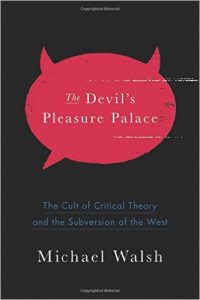 I read this book because it seemed like it would be an interesting companion to James Burnham’s “Suicide of the West.” Burnham’s book explains and analyzes the ideology of American liberalism, circa 1960. “The Devil’s Pleasure Palace” in a sense continues that story; it explains how that liberalism discovered the Critical Theory leftism of the Frankfurt School, and like Gollum discovering the One Ring, did not benefit from the discovery. “The Devil’s Pleasure Palace” is, indeed, somewhat interesting. But it generally fails at explanation and analysis, instead being mostly a rambling diatribe preaching to the converted.
I read this book because it seemed like it would be an interesting companion to James Burnham’s “Suicide of the West.” Burnham’s book explains and analyzes the ideology of American liberalism, circa 1960. “The Devil’s Pleasure Palace” in a sense continues that story; it explains how that liberalism discovered the Critical Theory leftism of the Frankfurt School, and like Gollum discovering the One Ring, did not benefit from the discovery. “The Devil’s Pleasure Palace” is, indeed, somewhat interesting. But it generally fails at explanation and analysis, instead being mostly a rambling diatribe preaching to the converted.
The core of Walsh’s book is an attack upon the Frankfurt School and its “Critical Theory.” The Frankfurt School was a group of Marxist German scholars, many from Goethe University’s Institute For Social Research in Frankfurt, who fled to the US before and after World War II, and then proceeded to repay this country’s generosity by deliberately destroying its culture. These men included Theodor Adorno, Erich Fromm, Max Horkheimer, and Herbert Marcuse. They also include, in Walsh’s telling, indirectly, men like the Communist Antonio Gramsci (famous for calling for a “long march through the institutions,” though he did not use those exact words, to combat bourgeois “cultural hegemony”) and Georg Lukács, the Hungarian Communist (not to be confused with the writer John Lukács). The key principal of the Frankfurt School was that the existing culture of the West must be destroyed and replaced, because it is irrational and oppressive, originating in and containing nothing good.
Walsh’s premise is that the philosophy collectively promulgated by these men, Critical Theory, was a departure from earlier American liberalism, and a pernicious departure, that has since infected all America with its poison. This infection was accomplished through the adoption and application of the Frankfurt School’s social theories by legions of American-born radicals embedded throughout the key institutions of the West. To Walsh, Critical Theory is merely “cultural Marxism.” And, like economic Marxism, its goal is the destruction of the current society and its replacement by something new, better, and totally different. But instead of the workers being the driving engine, the educated classes would be. “They had been let down by the grubby, unwashed workers of the world, who largely rejected the great gift they had been offered; now they would approach their equals in the intelligentsia, a far more receptive and persuadable audience.”
Among other core ideas of the Frankfurt School much in evidence today, for example in the frenzied demands for political correctness on campus and in the workplace, and in reactions to Donald Trump, is Marcuse’s “repressive tolerance”—the idea that real tolerance consists of intolerance of incorrect views. Or, as Wikipedia summarizes the idea, “Revolutionary minorities hold the truth and the majority has to be liberated from error by being re-educated in the truth by this minority. The revolutionary minority are entitled to suppress rival and harmful opinions.” But Marcuse’s idea is only one of many dubious gifts bestowed on modern America by the Frankfurt School—nearly any organized modern attack on American traditions is at least in part a result of the machinations of the Frankfurt School and its acolytes.
While the degree and emphasis of Critical Theory was new in America, and its impact heightened by other cultural changes, the idea that the existing culture must continuously justify itself to reason and be replaced if rationally determined to be deficient, is as old as America, as seen in the debates between Thomas Paine and Edmund Burke. Attempts to undermine and destroy a society’s culture are nothing new in the post-Enlightenment world, though the Frankfurt School has been uniquely successful in having their corrosive ideas adopted through internal corruption rather than imposed by external force or actual revolution. True, what distinguishes adherents of the Frankfurt School is their nihilism, in that they are less interested in what the new society will be than in destroying the old. This is well covered by Walsh, but he does not tie his discussion to longer-term currents of American political thought, which would have made his analysis stronger.
But linear discussion about the Frankfurt School is actually a small part of the book, and not particularly well developed. My summary above is pieced together. The rest of the book is a rambling series of asides relating political points to classical music, H.P. Lovecraft, Milton, movies from Chinatown to “The Wild One,” and numerous operas (the name of the book is from a Schubert opera). Many of these asides are mildly interesting, and what Walsh is trying to do is, through an artistic lens, tie the evils of Critical Theory to its opposition to the traditional “heroic narrative” of the West. However, the net result feels like a fairly confused mishmash—neither political analysis nor clear social commentary. There is certainly no clear exposition and refutation of the Frankfurt School, which is why I read the book to begin with. And, while most of the book is heavily pessimistic, oddly, Walsh concludes his book on an optimistic note. “No political victory is ever permanent,” and Walsh apparently believes that by returning to the heroic narrative and the explication of virtues, American conservatives can ultimately defeat the poison of Critical Theory. He doesn’t really say how, or develop this throwaway optimism, though. It’s just a jarring conclusion to an ambitious, but ultimately largely incoherent, book.
